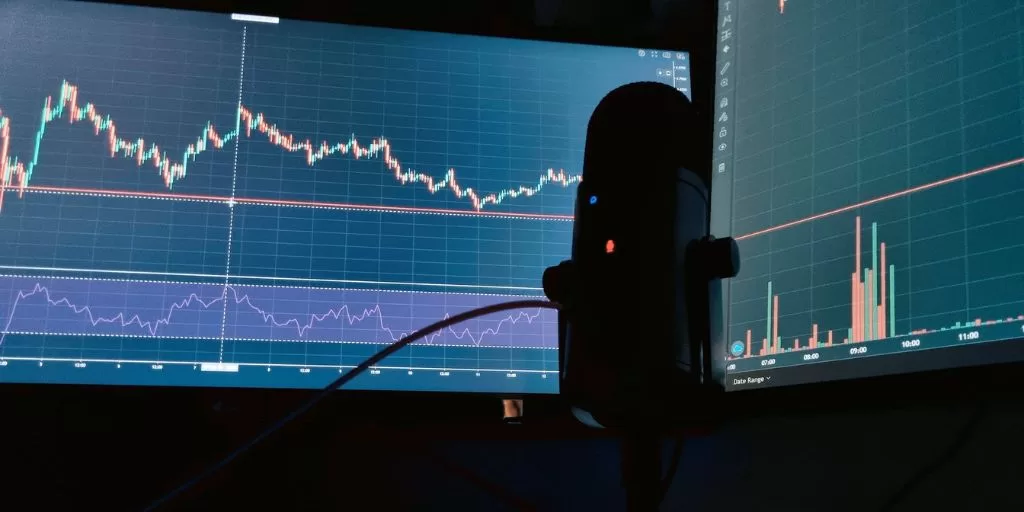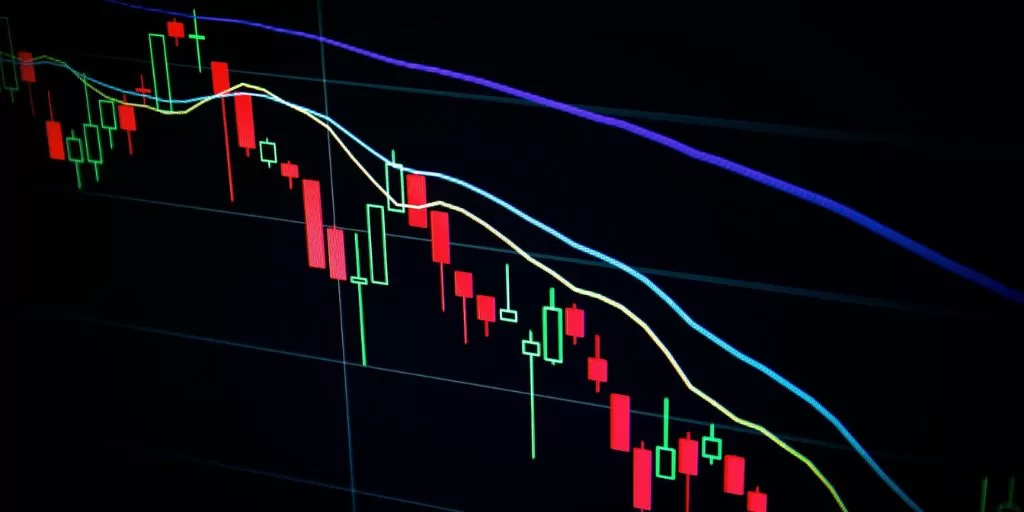Disclaimer: This text is for educational purposes only. It is not to be perceived as investment advice.
Trading in the financial markets can be a stressful endeavor. It requires discipline, knowledge, and an understanding of market dynamics to make informed decisions. Additionally, managing the emotional responses that come with trading is essential for success. In this article, techniques to cope with stress when trading will be explored through the lens of professional traders’ investment philosophy.
The mental strain of being exposed to volatile markets has been well-documented among traders and investors alike. While it can be difficult to remain composed during times of uncertainty, having strategies to help manage stress levels is key to maximizing performance and minimizing losses.
This article seeks to provide readers with insight into how they can adopt renowned principles in order to reduce their exposure to fear-based decision-making while trading and lead them on a path toward greater success in the markets.
Table of Contents
- 1 Why Do Most Traders Fail?
- 2 Day Trading: Stress, Anxiety, and Depression
- 3 Why Stress Management Strategies Are Important for Traders?
- 4 How to Maintain a Healthy Work and Life Balance?
- 5 What Causes Negative Emotions When Trading?
- 6 Acknowledge Your Mistakes, Learn from Them, and Calm Down
- 7 Stick to Your Plan
- 8 Psychological Coping Strategies for Handling Losses
- 9 Conclusion: Stress Management Is Essential in Trading
Why Do Most Traders Fail?

It is often said that 95% of traders fail, and while the accuracy of this statistic is debatable, there is no doubt that trading can be an incredibly stressful pursuit. Trading involves risk; it requires constant vigilance to monitor markets and identify potential opportunities or threats. As a result, many traders experience high levels of stress which can lead to anxiety and depression if left unchecked. In order to succeed in trading, it is important for traders to understand how to manage their stress and remain focused on their goals.
The first step toward managing trading-related stress is understanding why traders fail in the first place. One theory suggests that most unsuccessful traders are overly reliant on technical indicators when making decisions rather than relying on fundamental analysis or other forms of market research. This could cause them to make poor decisions based solely on what has worked in the past without considering future trends or external factors such as macroeconomic news events. Furthermore, some inexperienced traders may lack discipline when it comes to following their own strategy; they may become too greedy or take risks that are not supported by sound logic and data analysis.
Another reason why many traders tend to struggle with success is setting unrealistic expectations about the amount of time required for successful trading. It takes time and effort to develop a profitable trading system and even more dedication to stick with it over the long term. Many novice traders overestimate their skills at predicting markets correctly and underestimate the amount of work required – this leads them down a path where losses accumulate quickly due to impatience or impulsivity.
Finally, emotional control plays an essential role in achieving success as a trader. Fear, greed, hope, and regret can all affect our decision-making process – turning potentially profitable trades into costly mistakes if we let our emotions get out of hand instead of ensuring objectivity prevails throughout every trade we make. Successful traders know how important self-control is; they have learned how these emotions operate within themselves allowing them to stay focused on sound strategies during volatile times in order to minimize losses and maximize profits over time.
Having explored some common theories behind why many traders fail, next we will investigate day trading: stress, anxiety, and depression associated with this type of active trading approach…
Day Trading: Stress, Anxiety, and Depression
Day trading is an active form of investing that requires traders to make quick decisions and manage multiple positions at once. While this approach can be profitable, it also carries a high degree of risk which means that it can create significant levels of stress for the trader. Anxiety, depression, and other mental health issues are common among day traders due to their intense focus on monitoring markets and making split-second decisions.
In order to reduce the negative effects of stress when day trading, it is important for traders to ensure they have a balanced portfolio with different asset classes such as stocks, bonds, commodities, and currencies. This gives them diversification so that losses in one area can be offset by gains in another – providing more stability over time. Additionally, many experienced day traders recommend limiting trades per day or week; not only does this help protect against excessive risks but it also allows for better decision-making since traders will have more time to review their strategies before placing orders.
It is also important for traders to stay informed about news events that could affect the markets they are trading in. Having up-to-date information helps increase confidence while reducing anxiety since they know they are making decisions based on accurate data rather than speculation or guesswork. Finally, having a plan of action ahead of time ensures consistency in approaches taken during both bullish and bearish market conditions; without a strategy, there is no structure allowing emotions like fear or greed to creep into decision-making processes – potentially leading to costly mistakes instead of profits.
Given the potential psychological impacts associated with day trading, effective stress management strategies become even more crucial for successful outcomes. Without proper control over our emotions, we may find ourselves unable to act objectively when faced with difficult situations – increasing risk exposure and damaging long-term results regardless of how good our system might be otherwise.
TIP: Incorporating regular meditation into your routine can help you improve your mental well-being and assist you in coping with stress.
Why Stress Management Strategies Are Important for Traders?
Stress management strategies are essential for traders to ensure that they can make sound decisions in the heat of the moment. With so many variables at play, day trading carries a high degree of risk and requires intense focus on monitoring markets while making quick decisions. Without proper stress control techniques, it is easy for emotions like fear or greed to take hold – leading to costly mistakes instead of profits. Here are three reasons why managing stress when trading is important:
- Firstly, understanding how leverage affects your trading strategies in different markets such as foreign exchange (Forex), stock markets, or cryptocurrency markets helps put trades into perspective by highlighting potential risks against possible rewards. This allows traders to be more rational with their decision-making processes; reducing anxiety and increasing confidence in the outcomes. It’s also important to keep an eye on the macroeconomic data and central bank interest rates.
- Secondly, having an effective plan ahead of time ensures consistency regardless of market conditions. Knowing what steps need to be taken during both bullish and bearish periods gives a structure that eliminates guesswork and speculation from decisions made while also providing much-needed direction during times of uncertainty.
- Thirdly, staying informed about news events that could affect various markets provides an additional layer of protection since traders have access to up-to-date information about inflation expectations and other indicators that may influence price movements – allowing them to act objectively rather than emotionally when faced with difficult situations.
By understanding these key points behind successful stress management strategies, day traders can increase their chances of achieving profitable results over time without succumbing to emotional pitfalls along the way.
How to Maintain a Healthy Work and Life Balance?

Maintaining a healthy work and life balance is essential for traders who want to keep their stress levels manageable. With so much of our lives now taking place online, it can be easy to become overwhelmed by the markets or news events that have an impact on trading decisions – making it difficult to stay focused on what really matters. Here are four tips for how to maintain this balance:
Firstly, having clear boundaries between working hours and leisure time is important in order to make sure that you don’t overwork yourself without any downtime. This could mean setting a specific start and end time each day as well as scheduling breaks throughout the day in order to give your mind a rest from the intensity of trading.
Secondly, monitoring global trade trends such as understanding the implications of deficits or changes in supply chains due to international disputes should not take precedence over looking after yourself. Keeping up with regulatory developments like those issued by Financial Conduct Authority (FCA) or central banks can also provide additional context but shouldn’t be your sole focus when managing stress.
Thirdly, staying informed about cryptocurrency infrastructure rules or other technological advancements used within day trading can help identify opportunities while staying ahead of the competition – providing peace of mind when considering risk-benefit scenarios associated with investments.
Finally, instead of focusing energy on outcomes outside one’s control – such as market conditions – redirecting attention toward activities that bring joy and satisfaction will reduce stress levels which helps ensure more balanced decision-making processes overall.
By following these steps, traders can better manage their mental health while still keeping pace with modern markets; allowing them to continue reaping profits without sacrificing personal well-being in pursuit of success.
Focus on What You Can Control
When it comes to trading, a lot of the stress experienced can come from feeling like one does not have full control over their decisions or outcomes. While this is true in some respects – such as being unable to predict changes in currency exchange rates due to central bank policy tightening – there are other aspects that traders can focus on which will provide them with more control and peace of mind while making trades.
Firstly, having an understanding of global indices such as the Dow Jones Industrial Average (DJIA) can help traders understand how different markets interact with each other, providing valuable context for forex trading decisions. Similarly, keeping up-to-date with news events related to finance and economics helps identify potential opportunities or risks associated with investments; allowing traders to be proactive instead of reactive when considering trades.
Secondly, taking advantage of technical analysis tools offered by brokers or independent software providers offers insights into market trends without needing deep expertise in charting techniques – helping make better-informed decisions regarding entry and exit points based on current data rather than relying solely on gut instinct or hunches about price movements. This allows for lower-risk trades since positions are taken after careful consideration rather than quick reactions which could lead to losses.
Finally, staying relaxed yet alert during trade sessions will allow traders to assess situations objectively rather than getting carried away by emotion – leading toward no-stress trading if done consistently over time. The key here is finding ways to stay focused while still maintaining a sense of calmness so that decisions made are logical and well thought out; something that cannot be achieved if overtiredness or fatigue takes hold due to lack of rest between sessions. Taking some time off now and then gives both the body and mind much-needed respite before returning back refreshed – able once again to tackle whatever challenges may arise within the markets.
Take Some Time and Relax
It is no secret that trading can be a stressful experience. With the ever-changing dynamics of international trade relations, stock markets, and global currencies; traders have to remain agile and up-to-date in order to manage their portfolios effectively. However, stress can also be counterproductive when it comes to making trades as fear or haste may cause decisions that later result in losses instead of gains.
The question then becomes how can one reduce the level of stress experienced while trading? The answer lies in understanding why negative emotions often arise during market movements and how best to prepare for them beforehand. To start with, it is important to understand what causes such feelings – whether from external sources like news headlines or internal reactions due to a lack of confidence in one’s own abilities – so that steps can be taken toward reducing their presence or impact on trading decisions.
A wise and useful method for decreasing stress through mitigating risk associated with investing is diversification; spreading out capital across multiple types of investments allows traders to benefit from different trends without having all eggs in one basket should any one instrument suffer major losses over time. This way exposure stays balanced even if certain sectors are performing poorly while others are doing well; minimizing potential shocks felt by individual positions within an overall portfolio structure. In the long run, this strategy causes you to stress less because you are aware that even if the prices of some of your securities drop – there are still others that can raise. By incorporating smart moves like this one into your trading routine, you can just sit back, relax, and admire the beauty of the day.
Another useful strategy to improve your well-being is taking regular walks to a local park. Nature therapy can help you reduce your stress levels, regroup your thoughts, and recharge your batteries through exposure to natural surroundings. A 15-minute walk to a local park is enough to take some weight off your shoulders and allow you to feel better. It’s important to note that exposure to nature (aka ecotherapy or green therapy) can cause not just psychological but also physiologically improvements in your overall well-being.
Lastly, keeping track of your past results provides valuable insight into how different strategies work under various conditions – allowing traders to better anticipate future outcomes based on the data already seen rather than relying solely on guesswork about possible scenarios ahead. Doing this will help build a knowledge base that increases comfort levels when dealing with difficult situations that inevitably arise throughout the course of trading activity; giving more control over the state of mind regardless of current performance metrics being tracked at any given moment. Such an analysis can clear your mind of worries and negative thoughts and allow you to focus on the periods when you were making financial gains. For instance, if you are losing now and there’s nothing that can be done – instead of blaming yourself for the loss, take a couple of deep breaths, reset your mind, and grab your training journal to take a look at previous periods when you actually made some wins. It will not only make you feel better but can also give you more insight into what actually works – by analyzing what steps led you to victory in the past, you can discover some useful ideas and implement them now!
What Causes Negative Emotions When Trading?

Trading in the financial markets, whether it be stocks, forex, or other securities, can present a number of challenges. From understanding regulations set by various governing bodies to managing risk associated with each individual position taken; all these elements can lead to heightened stress levels if not managed properly. But what exactly causes negative emotions when trading?
One major source of anxiety is often rooted in unrealistic expectations placed upon oneself prior to entering into any given market – this could be anything from an expectation that one will make money right away without considering factors such as fees and commissions, or failing to adequately research which investments are best suited for one’s particular goals and objectives. Such misaligned thinking leads to disappointment when reality does not meet personal projections made beforehand; creating feelings of frustration which may then manifest themselves during actual trading sessions thus negatively impacting decision-making abilities going forward.
Another key factor contributing to fear-based reactions while trading is the presence of uncertainty within most markets. For example, currency exchange rates on the Forex market are constantly fluctuating due to ever-changing geopolitical forces at work – so even if one has done their homework thoroughly and prepared accordingly there still remains a degree of unpredictability as no one knows for sure how currencies will move next. This type of situation creates unease among investors who feel they have little control over their fate; leading them down paths where emotion overrides logic resulting in hasty decisions based on hope rather than a rational assessment based on facts available at the time trades were executed.
Finally, lack of knowledge regarding security regulations imposed by different governments around the world also plays a role here as many traders may inadvertently find themselves running afoul of rules enforced by certain countries or jurisdictions – something which could result in serious repercussions should offenses go undetected until too late. To protect against this happening, it is important that traders familiarize themselves with local laws pertaining to investing before attempting any transactions related thereto; otherwise, penalties incurred might wipe out gains made previously thereby exacerbating already existing sense of helplessness felt amidst turbulent waters encountered during typical day’s worth activity perpetrated within capital markets worldwide.
Unrealistic Expectations
Unrealistic expectations can be an especially detrimental source of stress when it comes to trading. Investors should take the time to understand what is realistically achievable with their particular style and strategy, as well as how fees and commissions may influence returns. It is easy for traders to become too optimistic, leading them down a path where they expect instantaneous profits without considering any potential risks associated with such investments. If these expectations are not met, disappointment inevitably follows – creating feelings of frustration which can then manifest during actual trading sessions, thus negatively impacting decision-making abilities.
In order to avoid such negative emotions, investors must ensure that all expectations placed upon themselves prior to entering into any given market are realistic and that rigorous due diligence has been completed in assessing which investments best suit one’s goals and objectives.
Here are some key points to consider when setting realistic expectations:
- Understand Your Investing Goals: Before even thinking about engaging in markets, it is important to recognize why you are doing so in the first place. Having clear-cut objectives will help guide decisions being made regarding risk management strategies, entry/exit points, etc.
- Do Your Research: Once goals have been established, researching various securities (stocks, forex, etc.) available on each exchange before committing capital toward any individual position is a critical step in mitigating losses over a long-term horizon. Seeking out experienced advisors or mentors who already have a knowledge base in related topics also helps here; allowing less experienced individuals to gain insights gleaned from professionals operating within the same space without having to invest the same amount of money or resources necessary to achieve the same level of success achieved by experts in the field.
- Manage Risk Appropriately: Developing a plan outlining exactly how much risk are you willing to take per trade beforehand is essential to ensuring no surprises arise once actually executing transactions in the live environment (or paper traded simulations). Setting stop loss levels at predetermined price points allows traders to limit potency gains while simultaneously restricting magnitude potential losses if the market moves against them unexpectedly; something worth taking into consideration regardless of the type of investment being considered to make sure the correct balance between reward & risk is maintained throughout the entire process.
- Compare Your Results With Other Professionals: Comparing performance results generated by own trades with employed professional fund managers give valuable perspective on overall progress being made in understanding financial markets. It can also suggest possible adjustments that are to be taken in order to strengthen the current methodology and optimize future outcomes obtained through active participation. Actively monitoring performance changes occurring across the industry is a vital strategy allowing you to stay ahead at the end of the day. This is mostly because professional traders are trained to minimize the risks first and comparing your moves with theirs will teach you how to minimize potential losses.
Comparing Your Results with Other Professionals
Interestingly, the journey of a successful trader is often marked by both high and low points. The ability to compare one’s own performance results with those of professional fund managers can provide invaluable insight into how far along their trading careers are. This comparison technique helps to highlight areas that need improvement as well as successes achieved in order to progress further down the path toward becoming a more profitable investor over time. In short, it serves as an effective way for traders to gauge their individual levels of stress when engaging in markets, allowing them to make informed decisions regarding risk management strategies accordingly.
In business, comparing oneself against others within the same industry or field allows investors to develop an understanding of what works best and where improvements may be necessary in order to remain competitive going forward. Such comparisons can even help identify problems before they arise through gaining valuable insights from observing other professionals’ processes which can then be evaluated and implemented if deemed suitable. Similarly, looking at different styles employed by experienced traders can also lead to enhanced decision-making capabilities; ultimately leading to greater success when dealing with financial markets themselves!
The importance of evaluating these types of comparative analysis cannot be overstated – especially during times when stress levels tend to rise due to market volatility or personal issues off-exchange. Also, having some form of benchmarking process in place acts as a reference point in assessing overall progress made so far. This allows us to quickly spot any changes in behavior that might occur during such periods thereby enabling corrective measures that need to be taken to prevent large losses from occurring unnecessarily.
Lack of Patience
Patience is an invaluable asset when investing and trading in the markets. Without it, traders are more likely to make hasty decisions or react impulsively to market news which can often lead to disastrous consequences. Patience allows investors to take a step back from their trades and view them objectively, as well as allowing time for research into potential investments before they commit capital. This type of attitude promotes rational decision-making rather than emotional responses, thus reducing stress levels associated with such activities.
However, patience isn’t just important when managing risk; it also plays an essential role in business success itself. Good businesses tend to require long timelines due to the nature of their core operations – even if they have great ideas that could potentially benefit shareholders greatly in the short term! As such, having patience during periods where returns may not be immediately forthcoming demonstrates dedication toward achieving greater rewards over time through sustained commitment and effort.
The lack of this quality amongst some traders can result in feelings of frustration due to unmet expectations or goals – something that can easily spiral out of control given how volatile markets can be at times. In order to mitigate such negative emotions arising from impatience, traders must learn proper strategies for dealing with these issues by understanding what works best for them individually and consistently implementing those techniques on a regular basis until desired results are obtained.
It is clear then that patience cannot be underestimated when engaging in financial markets – but there’s another key factor that needs consideration too: self-trust. After all, without trust in one’s own abilities, many would find themselves unable to progress beyond certain points no matter how much work was put into improving performance metrics!
Lack of Self-trust
Just as patience is an essential factor of successful investing, so too is self-trust. To be able to make sound decisions when trading in the markets requires confidence – not only in one’s own abilities but also in their ability to accurately forecast outcomes and gauge risk levels associated with potential investments. Without this trust, traders are often more likely to succumb to feelings of stress due to fear or uncertainty about how certain trades may pan out. This can lead them into making impulsive decisions that could have far-reaching implications for their portfolios!
In order to combat such issues, it is important that investors build up a strong sense of self-trust by learning from past experiences and analyzing their successes and failures objectively. This allows them to identify weaknesses in their strategies while simultaneously understanding where they excel – something that will ultimately help reduce any unnecessary stresses associated with trading activities. It is also wise for investors to take advantage of resources available online such as blogs or forums which offer insights into market movements or investor sentiment; these can help provide confirmation when considering whether or not a particular investment opportunity should be pursued.
Moreover, establishing practical goals along with realistic expectations before entering a trade helps ensure the focus remains on achieving desired objectives rather than chasing after short-term gains that come with no guarantees of success. This approach encourages discipline within the trader’s practice, enabling them to remain calm amidst turbulent conditions without letting emotions cloud judgment or interfere with decision-making processes.
By taking steps toward developing both patience and self-trust, investors can significantly reduce the amount of stress typically encountered during times spent engaged in financial markets activities – allowing them instead to better navigate through complex scenarios and seize opportunities presented by changing trends confidently.
Impulsive Trading
Impulsive trading can be a major cause of stress for traders, as it often means taking decisions without considering the risks involved. A trader’s emotions may influence their decisions and lead to costly mistakes; this is why it is important to keep a cool head when making investment choices. It helps to develop an understanding of how markets operate and become familiar with various strategies used by investors in order to make informed decisions rather than responding impulsively.
Investors should take time to analyze potential investments thoroughly before entering into any trades; this includes researching financial trends, assessing market conditions, and studying company performance or industry developments. Doing so allows them to gain insight into which stocks are likely to yield the best returns while simultaneously managing associated risks. On top of that, creating specific goals that focus on long-term success instead of short-term gains will help minimize the chances of succumbing to impulse buying or selling activities – something that could have devastating consequences if not properly managed!
In addition, diversifying portfolios across many different asset classes can reduce overall exposure levels as well as offer additional opportunities for growth through alternative investments outside traditional equities or bonds. This process requires consideration of both risk tolerance and return expectations alongside other factors such as liquidity needs or tax implications depending upon individual circumstances – all of which must be taken into account prior to committing funds toward new opportunities.
Ultimately, investing is a business endeavor requiring discipline and rational decision-making processes in order for traders to achieve consistent results over time. By recognizing the importance of these elements within their practice along with the need for patience and self-trust, investors can limit emotional responses whilst still remaining alert enough to seize profitable opportunities presented by changing trends in the markets.
Acknowledge Your Mistakes, Learn from Them, and Calm Down

Investing can be an emotional rollercoaster, and it is important to not let stress overwhelm you when trading. It is natural for mistakes to happen in the business of investing; however, it is essential that these errors are acknowledged, learned from, and then remembered as valuable lessons. Recognizing a misstep and taking the time to review what went wrong helps traders become better prepared for future investment decisions.
In addition to this acceptance of missteps, calming down after making a mistake is just as crucial. Taking deep breaths or engaging in mindfulness exercises such as meditation can help reduce anxiety levels while also providing clarity on how best to move forward with new trades. This process allows investors to clear their minds before launching into action and will ultimately lead them toward more successful outcomes by enabling wise decision-making processes rather than impulsive ones!
It is also beneficial for traders to remember why they chose certain stocks in the first place – was it based upon research? Was there any logic involved? Did fundamentals support the purchase? Understanding the rationale behind investments gives insight into whether current positions should be held onto or sold off depending on present conditions – something which requires careful consideration given potential losses incurred if incorrect choices are made!
Ultimately, every trader’s journey will involve some degree of trial and error as well as successes along the way; both need to be embraced in order to reach one’s goals effectively. By acknowledging imperfections without allowing them to overpower rational thought processes, investors will remain focused enough to make sound judgment calls during times of uncertainty – leading them ever closer to achieving desired results over time.
Stick to Your Plan
When investing and trading, it is essential to stick to one’s plan. This involves having a strategy in place beforehand that outlines the steps required for successful investment decisions. The process can be broken down into three main parts: analysis, execution, and monitoring of trades.
Analysis requires traders to examine market conditions as well as individual stocks before making any purchases or sales – this includes researching company fundamentals such as financial statements and industry trends. Once an investor has identified potential opportunities based on their research, they must then decide how best to execute these trades given current circumstances; typically through either buying or selling securities at predetermined prices. Finally, all investments should constantly be monitored after purchase so that necessary adjustments can be made if markets suddenly shift direction due to unforeseen events.
Despite having a well-thought-out plan in place, investors still need to remain flexible with their strategies; being willing to make changes when appropriate will help ensure maximum profits are achieved over time whilst minimizing losses from bad trades too. Having said that though, it’s important not to become overly influenced by short-term movements which may prove inconsequential in the long run – staying true to one’s original plans often yields better results than reacting impulsively without evaluating possible outcomes first.
The key takeaway here is that investors should always stay focused on their goals and trust the processes put in place prior to entering any trade; doing this will maximize success rates while also reducing stress levels associated with dealing with unpredictable markets.
Psychological Coping Strategies for Handling Losses
When investing, it is inevitable that losses will be incurred from time to time. Unfortunately, this can lead to considerable stress and anxiety for those who are new to the business or inexperienced in managing their finances. Luckily though, there are a number of psychological coping strategies that can help investors handle these difficult situations more effectively.
Firstly, one must understand that any losses experienced should not be seen as failures – rather they should be thought of as learning opportunities which provide valuable lessons on what works and what doesn’t work when trading securities. Also, focusing on successful trades can also help traders stay motivated while continuing to pursue profitable investments; if one trade goes wrong it shouldn’t mean giving up completely!
Next, it is important for individuals to take breaks from their trading activities every now and then – investing isn’t about beating others at their game but being able to control your emotions so you don’t beat yourself. Taking regular pauses allows people to step away from stressful market conditions and reset themselves mentally before returning with renewed strength.
Finally, having an open dialogue with other traders may also prove beneficial in dealing with losses; talking through issues with peers can often offer much-needed perspective and reassurance during challenging times. Whether seeking advice from professionals or simply discussing experiences amongst friends over dinner, these conversations serve as excellent outlets for releasing built-up tension associated with financial setbacks.
By following such guidelines alongside maintaining an organized plan throughout all stages of investing – analysis, execution, and monitoring – investors can both minimize losses while simultaneously cultivating better habits around handling them when they inevitably occur.
Conclusion: Stress Management Is Essential in Trading

It is no secret that trading can be a stressful endeavor. The risk of loss, the mental strain and pressure to succeed, as well as the daily grind of managing investments all contribute to an environment where stress levels are high. While it is true that some degree of stress is necessary in order to stay motivated and competitive, too much stress can lead to mistakes and ultimately failure. As Warren Buffet said: “Someone’s sitting in the shade today because someone planted a tree a long time ago”. Thus, learning how to deal with stress when trading is essential for any successful trader.
The first step toward reducing stress while trading is understanding why most traders fail – which often boils down to a lack of discipline or overtrading due to emotions like fear and greed. Knowing what causes losses will help you avoid making these same mistakes yourself by developing proper strategies and sticking with them even under stressful conditions. Furthermore, focusing on what you can control such as your own actions rather than worrying about external factors beyond your control will also reduce anxiety associated with trading significantly.
Finally, it may be wise for traders to practice psychological coping strategies such as acknowledging their mistakes and calming down after experiencing losses. This helps build resilience which becomes increasingly important during those times when things go wrong during trades. By keeping these tips in mind and implementing healthy habits into one’s life overall, traders can remain calm under pressure and make better decisions resulting in more profitable trades over time.




